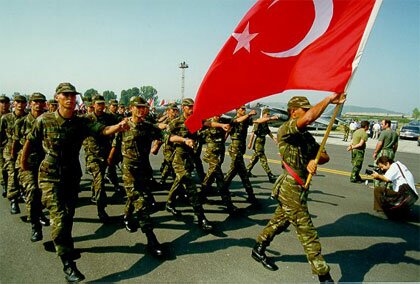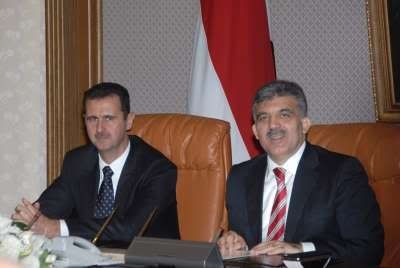
Turkey has no intention of sending combat troops to Afghanistan, Turkish President Abdullah Gul said on Wednesday. U.S. seeks more troops for Afghanistan from its NATO allies at the summit in Bucharest.
Turkey has no intention of sending more combat troops to Afghanistan, Gul said before he departed for NATO Summit in Bucharest on Wednesday. Gul will meet France President Nicolas Sarkozy and Britain Prime Minister Gordon Brown in the sidelines of the summit. Gul will be accompanied by Foreign Minister Ali Babacan and Defense Minister Vecdi Gonul.
Turkey joined the countries who distanced themself from U.S. President George W. Bush's call to send more troops to Afghanistan. French prime minister said on the eve of the meeting that Paris might send just several hundred soldiers and an aide to Sarkozy said France would make any new deployment dependent on an increase in foreign aid for Afghanistan.
Diplomats had hoped Sarkozy would tell a NATO summit starting in Bucharest later on Wednesday that France would make a major new contribution in Afghanistan as part of a revamp of the NATO peacekeeping force in the east and south.
Bush said the alliance could not afford to lose its battle against Taliban insurgents and al-Qaeda militants and recalled that France had indicated it could boost its 1,500-strong force. "As President Sarkozy put it in London last week, we cannot afford to lose Afghanistan. Whatever the cost, however difficult, we cannot afford it, we must win. I agree completely," he said in a speech before the summit.
Noting that France and Romania had signalled they could send more troops, he pursued a U.S.-led campaign for European NATO nations to increase their share of the fighting. "We ask other NATO nations to step forward with additional forces as well," he said.
SUMMIT MESSAGE
NATO allies want the Bucharest summit to send the message that its 47,000-strong force will stay in Afghanistan for as long as necessary to fight the insurgency. "Our alliance must maintain its resolve and finish the fight... If we do not defeat the terrorists in Afghanistan, we will face them on our soil," Bush said.
French Prime Minister Francois Fillon said on Tuesday Paris was looking to send several hundred more troops to Afghanistan. That was short of the 1,000 extra soldiers some NATO allies had expected and it was not clear whether it would be enough to cover a Canadian demand for reinforcements in the south.
Ottawa has said it could pull its 2,500 troops out of the fight next year if the reinforcements were not forthcoming. "The important thing is the decision in principle," a Sarkozy adviser told a briefing in Paris on Tuesday, adding that the precise size and location of any French deployment would have to be negotiated at the military level.
The adviser said Sarkozy had set out conditions for extra French troops in a letter to NATO allies. "He calls for a coordinated strategy whose goal will be a stable Afghanistan, reconciled with itself and free of terrorism and drug trafficking," he said.





 MOSUL, Iraq, Dec. 18 (Xinhua) --Turkish troops entered the Iraqi territories in the northern Kurdish autonomous region early on Tuesday, targeting Kurdish rebels, spokesman from the Kurdish border guards said.
MOSUL, Iraq, Dec. 18 (Xinhua) --Turkish troops entered the Iraqi territories in the northern Kurdish autonomous region early on Tuesday, targeting Kurdish rebels, spokesman from the Kurdish border guards said.

